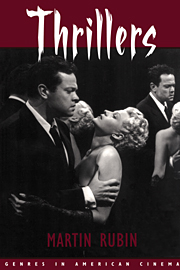Book contents
- Frontmatter
- Contents
- List of Illustrations
- Acknowledgments
- PART I APPROACHES
- PART II HISTORICAL OVERVIEW
- PART III FILM ANALYSES
- 6 The Detective Thriller: The Kennel Murder Case (1933), The Big Sleep (1946)
- 7 The Psychological Crime Thriller: Strangers on a Train (1951)
- 8 The Spy Thriller: Man Hunt (1941)
- 9 The Police Thriller: The French Connection (1971)
- 10 Conclusion
- Notes
- Selected Bibliography
- Filmography/Videography
- Index
9 - The Police Thriller: The French Connection (1971)
Published online by Cambridge University Press: 04 December 2009
- Frontmatter
- Contents
- List of Illustrations
- Acknowledgments
- PART I APPROACHES
- PART II HISTORICAL OVERVIEW
- PART III FILM ANALYSES
- 6 The Detective Thriller: The Kennel Murder Case (1933), The Big Sleep (1946)
- 7 The Psychological Crime Thriller: Strangers on a Train (1951)
- 8 The Spy Thriller: Man Hunt (1941)
- 9 The Police Thriller: The French Connection (1971)
- 10 Conclusion
- Notes
- Selected Bibliography
- Filmography/Videography
- Index
Summary
The police thriller is self-evidently distinguished from other subcategories of crime film in that it is a story in which the police and police work take the center stage. This contrasts with the other crime-film varieties, such as the detective film, psychological crime film, and gangster film, in which the police are usually present but more peripheral to the action.
The police film has a less pertinent literary background than do other major branches of the movie thriller, such as the detective film, horror film, and spy film. There has been no shortage of crime/mystery stories featuring policemen, beginning with Émile Gaboriau's Monsieur Lecoq in the 1860s, but the fictional police story has experienced difficulties in developing a distinct identity apart from the detective story. Some police protagonists, such as Josephine Tey's Alan Grant (first appearance, 1929) and Ngaio Marsh's Roderick Alleyn (1934), derive from Golden Age gentleman detectives like Philo Vance and Lord Peter Wimsey; others, such as Earl Derr Biggers's Charlie Chan (1925) and Georges Simenon's Jules Maigret (1932), are intuitive and philosophical in the manner of G. K. Chesterton's Father Brown; still others, such as Freeman Wills Crofts's Inspector French (1924) and Basil Thomson's Constable Richardson (1933), are more methodical in technique and conventional in personality. However, in all of these cases, the basic formula deviates little from that of the detective story (whether whodunit or hard-boiled), with an individualistic sleuth solving the puzzle of an eccentric and complicated crime.
- Type
- Chapter
- Information
- Thrillers , pp. 242 - 258Publisher: Cambridge University PressPrint publication year: 1999



